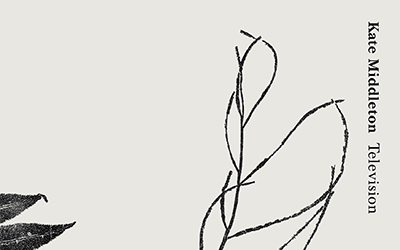
- Free Article: No
- Contents Category: Poetry
- Review Article: Yes
- Article Title: Time capsules
- Article Subtitle: Taking television seriously
- Online Only: No
- Custom Highlight Text:
In 2014, while judging the Forward Prize for Poetry – one of poetry’s most prestigious awards – broadcaster and author Jeremy Paxman declared that ‘[p]oetry has connived its own irrelevance’. Paxman was talking about his desire for poetry ‘to engage with ordinary people’, to speak beyond the borders of sandstone institutions and for poets to become what Shelley called ‘the unacknowledged legislators’.
- Featured Image (400px * 250px):

- Alt Tag (Featured Image): Tim Loveday reviews ‘Television: New poems’ by Kate Middleton
- Book 1 Title: Television
- Book 1 Subtitle: New poems
- Book 1 Biblio: Giramondo, $27 pb, 101 pp
- Book 1 Cover Small (400 x 600):

- Book 1 Cover (800 x 1200):

So what to make of a work that counters this charge; that positions those shows we might otherwise consider archive-worthy, or disposable, as objects of extreme significance; as time capsules that harness within them our capacities to understand ourselves and the world better, as such denying yet another push toward a reboot, a reappropriation or simply an erasure? What if we were to, once again, take television seriously?
Enter Kate Middleton’s fourth poetry collection, aptly titled Television, a work that looks at the profound reverberations, across a lifetime, of all that we consume on the ‘idiot box’, one that turns the kitsch, the barely legible artefact, back into an object of high art, pulsating with all the pent-up energy of waiting an entire week to find out what happens next.
In the opening line of the opening poem, titled ‘1’ (each ‘poem’ is numbered up to ‘33’, as if denoting a series in itself) Middleton writes:
you might say television proliferates inside my body
like so much gut bacteria: its good flora, its badinhabit my curious intestines, whet my brain’s strange
appetites: or you might say I’m an acolyte, thatmy autobiography can be written only through television
and TV mags, the pull-out posters of up-and-coming idols
The use of unrhyming couplets is typical of the numbered works in Television; in fact, beside the occasional single concluding line, the entire collection is written in this form. Likewise, there is not a single full-stop throughout, each section punctuated as a long continuous sentence with each stanza bleeding into the next.
This stream of consciousness, per se, is, however, effectively alleviated by the deft and original use of the colon as a mark that denotes not only ‘namely’ – a continuation of thought and a new point of connection – but a substantive pause, a significant shift in thinking that is not typically synonymous with the ‘:’. In this way, the colon has a unique function in Television; it acts as a literal portal, a sort of pictorial metaphor for an entry that mirrors – or acts as a simulacrum of – our zooming in to the television. The effect overall is a coalescing of information, a tsunami-like expedience in which objects both near and far – historical, political, and sociocultural – are bought into relation, collected around one another, and ultimately made refractory through the writer and the television as vessels.
Here, Middleton shows a mastery of enjambment and lineation. Every line and every stanza is self-contained, and yet each can be read on, exposing the poems to further nostalgic or philosophical unfurlings, often providing logical shifts, right turns that might be more synonymous with an em-dash or semi-colon. Instead, they are found in the literal breaks in stanzas – how these stanzas relate and are, sometimes, seemingly unrelated to one another. The picture is a body in constant motion, in a state of perpetual accumulation.
That is not to say that all the intertextual television references and events made throughout Television are all given the same weight (although, Middleton often treats analogue and digital content interchangeably). Luke Perry’s death acts as a lyrical motif throughout the book, sometimes, inadvertently perhaps, juxtaposed against fleeting references to Astro Boy, Big Little Lies, Buffy, Oprah, and The Apprentice, to name a few.
Indeed, there is nothing particularly cryptic in this book. Thus it leans towards prose, to memoir, a point that Middleton repeatedly brings into sharp focus, particularly when she writes lines such as ‘I could write a bibliomemoir: I’d ardently attest / The comforts of Green Gables, the psychology.’
But the power of this work is contained within the form itself – its capacity to mirror television while resisting some of the preloaded assumptions that make the form feel irreverent. In Middleton’s work, we are repeatedly reminded to slow down, to read closely, to sit with those stories held and contained within each episode, rather than binge the content and race toward the end.


Comments powered by CComment